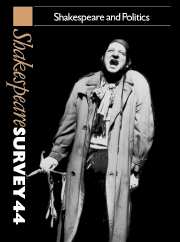Book contents
- Frontmatter
- Shakespeare and Politics
- Language, Politics, and Poverty in Shakespearian Drama
- Some Versions of Coup d’état, Rebellion and Revolution
- Woman, Language, and History in The Rape of Lucrece
- Love in Venice
- Two Kingdoms for Half-a-Crown
- ‘Fashion it thus’: Julius Caesar and the Politics of Theatrical Representation
- ’Demystifying the Mystery of State’: King Lear and the World Upside Down
- Tragedy, King Lear, and the Politics of the Heart
- The Politics of Shakespeare Production
- Shakespeare in the Trenches
- Shakespeare’s Earliest Editor, Ralph Crane
- Shakespeare’s Falconry
- Telling the Story of Shakespeare’s Playhouse World
- Shakespeare Performances in England, 1989–90
- Professional Shakespeare Productions in the British Isles January-December 1989
- Critical Studies
- Shakespeare’s Life, Times, and Stage
- Editions and Textual Studies
- Books Received
- Index
Shakespeare’s Falconry
Published online by Cambridge University Press: 28 March 2007
- Frontmatter
- Shakespeare and Politics
- Language, Politics, and Poverty in Shakespearian Drama
- Some Versions of Coup d’état, Rebellion and Revolution
- Woman, Language, and History in The Rape of Lucrece
- Love in Venice
- Two Kingdoms for Half-a-Crown
- ‘Fashion it thus’: Julius Caesar and the Politics of Theatrical Representation
- ’Demystifying the Mystery of State’: King Lear and the World Upside Down
- Tragedy, King Lear, and the Politics of the Heart
- The Politics of Shakespeare Production
- Shakespeare in the Trenches
- Shakespeare’s Earliest Editor, Ralph Crane
- Shakespeare’s Falconry
- Telling the Story of Shakespeare’s Playhouse World
- Shakespeare Performances in England, 1989–90
- Professional Shakespeare Productions in the British Isles January-December 1989
- Critical Studies
- Shakespeare’s Life, Times, and Stage
- Editions and Textual Studies
- Books Received
- Index
Summary
Talking of hawking - nothing else, my lord.
2 Henry VI 2.1.49There are two questions I shall try to answer. One is the nature of Shakespeare's knowledge of falconry and whether it can be shown to be based on personal experience. The other is the interpretation of a passage about the haggard falcon in Twelfth Night that seems to have been misunderstood by all editors and commentators from Dr Johnson onwards.
First the general topic. It is the common opinion of the few people who have a good knowledge of both falconry and Shakespeare that Shakespeare spoke on the subject from experience, probably picked up in his youth. But for the most part this opinion is presented as a matter of feeling not of demonstration. It is therefore sterile. Nothing can be built on it and it does not offer any technique or method for solving similar problems. But if there were a way of proving it or even of finding objective criteria of assessment, then it would clearly become much more valuable.
Let us begin with the most undebatable point - the frequency with which Shakespeare refers to hawking in comparison with his contemporaries. In Shakespeare there are over fifty mentions. In Kyd, Greene, Marlowe, and Fletcher (except for his sequel to The Taming of the Shrew) there are practically none. The same is true of Sidney. Even Herbert who was presumably born to the sport and Ben Jonson who had decided views on it mention hawks and hawking on only a handful of occasions. This is in itself rather surprising when there is so much about it that is so dramatic — the soaring of the falcon, the idea of a man in command of a bird circling (or 'towering') anything up to five hundred feet over his head, the sudden stoop that can reach a speed of over 200 mph, and the knock-out blow that it delivers with its talons.
- Type
- Chapter
- Information
- Shakespeare Survey , pp. 131 - 144Publisher: Cambridge University PressPrint publication year: 1991

